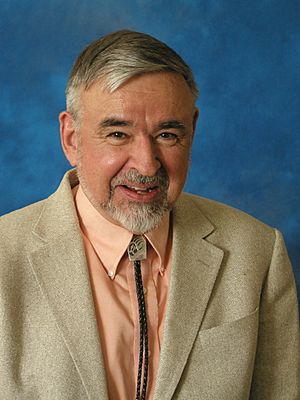Karl Butzer facts for kids
Quick facts for kids
Karl Butzer
|
|
|---|---|
 |
|
| Born | August 19, 1934 Mülheim, Germany
|
| Died | May 4, 2016 (aged 81) |
| Alma mater | McGill University (B.Sc., M.Sc.) University of Bonn (Ph.D.) |
| Occupation | Geographer, Cultural Ecologist and Environmental Archaeologist |
| Scientific career | |
| Fields | Geography, cultural ecology, environmental archaeology |
| Institutions | University of Wisconsin–Madison ETH Zurich University of Chicago University of Texas at Austin |
Karl W. Butzer (born August 19, 1934 – died May 4, 2016) was a German-born American scientist. He was a geographer, an ecologist, and an archaeologist. This means he studied the Earth, how living things interact with their environment, and old human history.
Karl Butzer went to McGill University in Canada. There he earned degrees in Mathematics, Meteorology, and Geography. Later, he studied in Germany at the University of Bonn. He earned his doctorate degree in physical geography there.
He taught at several universities during his career. These included the University of Wisconsin–Madison and the University of Chicago. He also taught at ETH Zurich in Switzerland. Later, he joined the Department of Geography and the Environment at University of Texas at Austin.
Contents
Life Story
Karl Butzer was born in 1934 in Mülheim, Germany. His family was Catholic. When he was a young child in 1937, his family left Germany. They moved to England first. Later, during World War II, they moved to Canada.
Karl Butzer passed away on May 4, 2016. He was 81 years old. He died in Austin, Texas.
Exploring the World: Karl Butzer's Fieldwork
Karl Butzer traveled all over the world for his studies. He worked in many different countries. His fieldwork helped us understand how people lived in the past. He also studied how environments changed over time.
- Egypt and Nubia: He did a lot of work in Egypt. He studied ancient sites and how the land changed. He even helped explore the 'Lost City of the Pyramids'.
- East Africa: He joined an expedition in Ethiopia. He also did independent research in Axum, Ethiopia.
- South Africa: Karl Butzer spent nine seasons working in South Africa. He studied ancient sites and the land's history. He worked at famous places like Taung and Swartkrans.
- Spain: He did research in Mallorca and Catalunya. He also worked on important excavations at Torralba-Ambrona. He even led a project studying the history of the environment in the Sierra de Espadan.
- Mexico: He made yearly trips to Mexico. He led a project called the Laguna Project. This project looked at how Spanish settlers changed the land. It also studied the environmental history of northern Mexico.
- Australia: He worked with another scientist, David Helgren. They studied how farm animals affected the land in New South Wales.
- Cyprus: He studied the history of the environment and ancient sites on the island of Cyprus.
- Other Places: His work also took him to Nova Scotia in Canada. He also studied ancient Celtic forts in northern Portugal.
Teaching and Mentoring Students
Karl Butzer was a dedicated teacher. He taught many different courses at universities. He helped students learn about the environment and human history.
At the University of Wisconsin, he taught about ancient environments. He also taught about how landforms are shaped. At the University of Chicago, he taught advanced courses. These included environmental archaeology.
He also started a new program in human geography in Switzerland. At the University of Texas, he taught about environmental history. He also taught about how culture and the environment interact.
He was very good at teaching. In 2005, he won an award for Outstanding Graduate Teaching. He helped 30 students earn their Ph.D. degrees. He also helped 16 students earn their Master's degrees.
Awards and Recognitions
Karl Butzer received many important awards for his work. These awards showed how much his research helped science.
- 2009: Melvin G. Marcus Distinguished Career Award
- Busk Medal from the Royal Geographical Society
- Fryxell Medal from the Society of American Archaeology
- 1986: Archaeological Geology Award
- 1991: Pomerance Award for Scientific Contributions to Archaeology
- 2002: Preston E. James Eminent Latin Americanist Career Award
- 1996: Became a member of the National Academy of Sciences
- Member of the American Academy of Arts and Sciences
See also
 In Spanish: Karl Butzer para niños
In Spanish: Karl Butzer para niños
 | Aurelia Browder |
 | Nannie Helen Burroughs |
 | Michelle Alexander |

